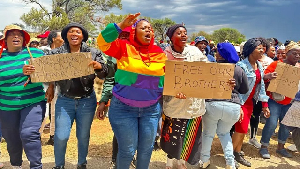Ms Christine Evans-Klock, the United Nations (UN) Resident Coordinator for Ghana, has challenged the youth to participate actively in the implementation of the Sustainable Development Goals (SDGs) and the Climate Change Agenda to make the future better.
She said the youth who formed one-third of the country’s population had a crucial role to play in attaining the SDGs and the Climate Change agenda also known as the Paris Agreement.
Ms Evans-Klock was speaking at the second Ghana Youth Conference on Climate Change and Sustainable Development (GYCCC-SD) organized by the National Youth Authority, Ministry of Environment, Science, Technology, and Innovation and the United Nations Development Programme in collaboration with Greener Impact International, a Non-Governmental Organization in Accra.
The conference was aimed at educating the youth on the SDGs and the Climate Change Agenda on the youth component of the outcome of the Paris Agreement.
It was also to promote the youth participation in online developmental dialogues through digital and social media as well as enhance their capacity to resolve issues through diplomatic negotiations in accordance with the ideals, charter, and practice of the UN.
Ms Evans-Klock said the youth could participate in achieving the SDGs through advocacy, taking action and holding duty bearers accountable.
She said the UN was confident that the ambitious goals of the 2030 Agenda and the Paris Agreement could be achieved through the alliances of government, civil society, the private sector, development partners and youth organizations.
The UN Resident Coordinator noted that there were enormous potential for new jobs and entrepreneurship in energy efficiency, renewable sources of energy, natural resource management, tourism, recycling, waste management and other areas, which the youth could venture into.
“I am confident that your engagement will make a huge difference to Ghana’s success in achieving the vision of the Global Agenda 2030 for green jobs, healthy communities, and accountable governance,” She said.
She said in 2015, the adoption of historic agendas for Africa at both the continental and global levels took place and indicated the readiness of the African continent to transform.
“At the continental level, African countries adopted Agenda 2063, the 50-year Transformative Agenda for Africa, and its First Ten Year Implementation Plan.
“At the global level, the UN General Assembly, nearly 200 countries adopted the 2030 Agenda for Sustainable Development and its 17 Sustainable Development Goals (SDGs),” She added.
Ms Evans -Klocks said both frameworks sought to achieve inclusive growth, sustainable development, peace and security for the continent, adding that, the SDGs, like the African Union Agenda 2063, is the People’s Agenda, which stemmed from grassroots consultations across the globe.
Said the SDGs was a political commitment and that it served as a Road Map for ending extreme poverty in all forms and for overcoming uneven progress across regions and within countries.
Ms Evans-Klocks said the SDGs was owned nationally, and each Government had the responsibility of setting out plans and strategies to achieve them, based on their priorities, starting points, and circumstances.
Present at the conference were representative from the office of the former President John Agyekum Kufuor, the UN Special Envoy on Climate Change and Officials of the MESTI
General News of Thursday, 31 August 2017
Source: Ghana News Agency

















